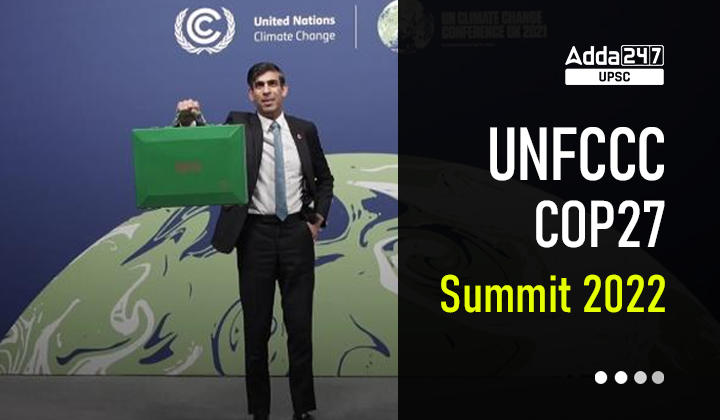Table of Contents
COP 27 Summit 2022- Why Important for UPSC Exam
UNFCCC COP 27 Summit 2022: COP 27 Summit is taking place in Egypt’s Sharm El-Sheikh. COP 27 Egypt is an important event towards combating climate change. UNFCCC COP 27 Summit 2022 is important for UPSC Prelims Exam (Climate Change and International Relations) and UPSC Mains Exam (UPSC GS Paper 2- International Relations).
COP 27 Summit 2022: Why in News?
- Recently, U.N. climate talks open in Egypt at COP 27 Summit 2022. climate compensation on agenda for first time
- The Indian delegation will be led by Union Environment Minister Bhupender Yadav to the 27th Session of Conference of Parties of the UNFCCC (COP 27) from November 6 to 18.
COP 27 Summit 2022- Key Details
- About: The 27th Conference of the Parties to the United Nations Framework Convention on Climate Change – COP27 – builds on the outcomes of COP26 to deliver action on an array of issues critical to tackling the climate emergency.
- COP 27 Agenda: COP27 seeks renewed solidarity between countries, to deliver on the landmark Paris Agreement, for people and the planet.
- The World today is Faced with a growing energy crisis, record greenhouse gas concentrations, and increasing extreme weather events.
- COP 27 Dates: UNFCCC COP 27 Summit 2022 is taking place from November 6 to 18.
- Participation: UNFCCC COP 27 Climate Summit 2022 is being attended by 196 countries, 45,000 people and 120 world leaders.
- Key Areas of Discussion: COP 27 Summit 2022 will be discussing on the following-
- Urgently reducing greenhouse gas emissions,
- Building resilience, and adapting to the inevitable impacts of climate change,
- Delivering on the commitments to finance climate action in developing countries.
India’s Agenda for at COP27
- India looks forward to substantial progress on the discussions related to climate finance and clarity on its definition, as officials from 200 nations gather for the COP27 summit 2022.
- India will work towards ensuring more clarity on the definition of climate finance for the developing countries in order to be able to accurately assess the extent of finance flows for climate action.
- India said that the absence of a definition allows developed countries to greenwash their finances and pass off loans as climate-related aid.
- Developing countries, including India, will also push rich countries to agree to a new global climate finance target – also known as the new collective quantified goal on climate finance (NCQG) — which they say should be in trillions as the costs of addressing and adapting to climate change have grown.
- Any consensus on an enhanced scale of financial mobilization could be a welcome takeaway from COP27.
- The figure of USD 100 billion for developing countries was agreed upon much before the Paris Agreement was signed.
- Based on the Nationally determined contributions (NDCs), the total cumulative financing requirements of the developing world is anything in the range of USD 5.8-5.9 trillion till 2030,.
- At the meet, India will also discuss the mantra of Lifestyle for Environment (LiFE), coined by Prime Minister Narendra Modi.
- “Lifestyle for Environment” (LiFE) is a pro-people and pro-planet effort that seeks to shift the world from mindless and wasteful consumption to mindful and deliberate utilization of natural resources.
- The environment ministry also stated that the discussion on NCQG in the ad-hoc working group must focus on the quantity of the resource flow and its quality and scope.
- Issues relating to access and suggestions for improvement in the function of the financial mechanisms are also important.
- An improvement in transparency to ensure appropriate oversight of the quantum and direction of flows is imperative.
United Nations Framework Convention on Climate Change (UNFCCC)- Key Points
- Background: UNFCC was signed in 1992 as a result of the United Nations Conference on Environment and Development.
- United Nations Conference on Environment and Development is also known by other names like the Earth Summit, the Rio Summit, or the Rio Conference.
- Two other outcomes of the Rio Conference were Convention on Biological Diversity and the land United Nations Convention to Combat Desertification.
- About UNFCCC: it is a multilateral treaty governing actions to combat climate change through adaptation and mitigation efforts directed at control of emission of Green House Gases (GHGs) that cause global warming.
- It is considered the parent treaty of both the Kyoto Protocol (1997) and the Paris Agreement (2015).
- UNFCC entered into force on 21st March 1994 and has been ratified by 197 countries.
- India ratified the UNFCCC in 1993.
- Nodal Agency in India: Ministry of Environment, Forests and Climate Change (MoEFCC) acts as the nodal agency for UNFCC in India.
BASIC countries at Glasgow Summit (CoP 26) of UNFCCC



 TSPSC Group 1 Question Paper 2024, Downl...
TSPSC Group 1 Question Paper 2024, Downl...
 TSPSC Group 1 Answer key 2024 Out, Downl...
TSPSC Group 1 Answer key 2024 Out, Downl...
 UPSC Prelims 2024 Question Paper, Downlo...
UPSC Prelims 2024 Question Paper, Downlo...




